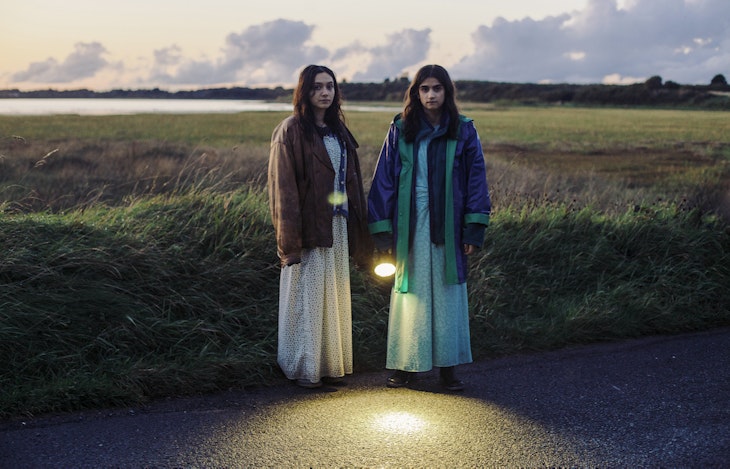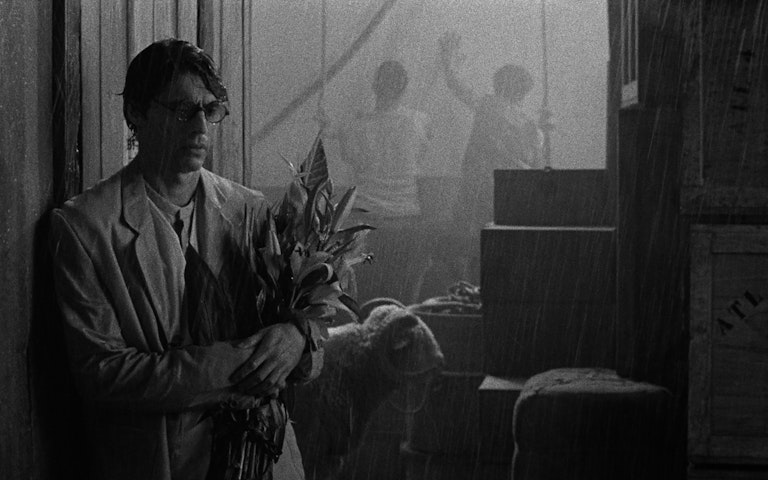Young Critics review: September Says

Review by Marina Zigneli
Sisterhood is a Weird Place to Be
Sisterhood can bear many guises. In the case of Ariane Labed’s September Says, it reveals itself as a spectrum where the distance between unconditional love and co-dependency is rather small. Labed’s feature-length directorial debut draws from Daisy Johnson’s 2020 novel Sisters to challenge our solidified notions of familial power dynamics.
September Says opens with playful giggles as the two sisters, September (Pascale Kann) and July (Mia Tharia), dressed up as the infamous twins in Stanley Kubrick’s The Shining, pose for their artist mother Sheela (Rakhee Thakrar). This initial playfulness shared between the family trio soon gives way to a darker atmosphere, driven by September’s overprotectiveness of July and the latter’s increasing dependence on her. Born just ten months apart, as their names betray, September and July share a bond so deep that it becomes difficult to discern where one ends and the other begins. We are soon drawn into the entwined universe they’ve created for themselves—a universe that, while at times claustrophobic, remains a safe haven for the two of them.
A terrible incident serves as the pivotal moment that splits the narrative in two. Labed uses it to create two distinct microcosms for the teenage sisters; one that unfolds during their school days where they must navigate harassing remarks and bullying from their peers, and another that finds them in their grandmother’s house in a coastal Irish town, where they care for themselves as their mother withdraws into isolation. These two microcosms operate under their own set of rules, largely shaped by the sisters’ 'September Says' game of dares, while their denouement is foreshadowed by a Shirley Jackson quote heard early in the film, according to which “no live organism can continue for long to exist sanely under conditions of absolute reality; even larks and katydids are supposed, by some, to dream”.
Balthazar Lab’s cinematography manages to visually capture the aforementioned shift in the narrative, transitioning from the grainy, confined look of 16mm film to the clearer, more expansive imagery of 35mm. The smaller format allows him to frame the three characters up close, emphasizing their togetherness as they share time at home. With Lab’s guidance, we observe the profound bond between September and July, where their intimacy and deep affection can be misconstrued as a desire to dominate and control. In contrast, the 35mm format immediately creates a visual and emotional distance between the two, with their mother frequently absent from the frame.
Labed consciously crafts this duality in her quest to portray the many facets of sisterly love, but most importantly of the female experience of growing up. Apart from the two sisters, Sheela, as a young single mother, is struggling to navigate her own reality, almost longing for someone like September to “instruct” her on what to do. The only time she is granted her personal time on screen is when she meets a man at the local pub and brings him home. During the ensuing one-night stand, her stream of consciousness takes center stage, creating a humorous yet deeply realistic portrayal of guilt-stricken single motherhood.
Balancing the complexities of sisterhood with the journey of self-discovery is no easy feat. With September Says, Labed creates more than the titular game of dares that conquers a household; she constructs a stunning debut whose contagious melancholia affirms the emotions of teenage girlhood.
Marina Zigneli
I'm a film critic currently in my third year of PhD studies, researching the work of Maria Plyta, the first female Greek director. Earlier this year, I was part of the European Workshop for Film Criticism and, since 2022, I’ve been a film selector for the Women Over 50 Film Festival. My writings, in both Greek and English, have been featured in various online and print publications.

